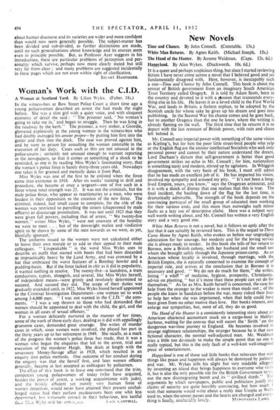Woman's Work with the C.I.D.
A Woman at Scotland Yard. By Lilian Wyles. (Faber. 18s.) IN the witness-box at Bow Street Police Court a short time ago a young policewoman described an arrest she had made the night before. She was a slim girl with a quiet voice, and with eloquent economy of detail she said : " The prisoner said, ' No woman's going to take me in,' and began to struggle. Then he was lying in the roadway by the kerb." The prisoner, a wiry stoker, a Geordie, glowered explosively at the young woman in the witness-box who had doubly outraged his amour propreby putting him first into the gutter and then into the dock. The case was proved against him, and he went to prison for assaulting the woman constable in the execution of her duty. Cases such as this are not unusual in the police-courts ; certainly not unusual enough to warrant reporting in the newspapers, so that it comes as something of a shock to be reminded, as one is by reading Miss Wyles's fascinating story, that the women's police force is barely thirty-three years old. Nowadays one takes it for granted and mentally dates it from Peel.
Miss Wyles was one of the first to be enlisted when the force came into existence in 1918. After six weeks' training in drill and procedure, she became at once a sergeant—one of five such in a force whose total strength was 25. It was not the criminals, but the male police force, who appear as reactionaries to a man, who were loudest in their opposition to the creation of the new force. The criminal, indeed, had small cause to complain, for the rOle of the woman was restricted to patrolling the streets (chaperoned by male officers) k) discourage prostitution. It was not until 1923 that they were given full powers, including that of arrest. " We twenty-five women," writes Miss Wyles, " were not unaware of the hostility we were to meet . . . but of the downright malice and vindictive spirit to be shown by some of the men towards us we were, as yet, blissfully- ignorant."
The uniforms issued to the women were not calculated either to boost their own morale or to add to their appeal to their male colleagues. " Unspeakable " is the word Miss Wyles uses to describe an outfit that started with boots that had been discarded as impracticably heavy by the Land Army, and was crowned by a hat that embraced the worst features of a Bombay bowler and a pudding-basin. But if the force lacked in chic as it did in popularity, it wanted nothing in resolve. The twenty-five—a laundress, a tram conductress, typists, shopgirls, and several, like Miss Wyles herself, of independent means—were grimly and resolutely determined to succeed. And succeed they did. The scope of their duties was gradually extended until, in 1922, Miss Wyles found herself appointed to the Criminal Investigation Department—one woman set to work among 3-4,000 men. " I was not wanted in the C.I.D." she com- ments. " I was a sop thrown to those who had demanded that women should be appointed to deal with the child, the girl, and the woman in all cases of sexual offences."
For a woman delicately nurtured in the manner of her times, some of the work of those early days, dealing as it did with appallingly gruesome cases, demanded great courage. She writes of murder cases in which, since women were involved, she played her part in the thirty years up to her retirement in 1949. She recalls, as a mark of the progress the women's police force has made, that it was a woman who began the enquiries that led to the arrest, trial and execution of the murderer Haigh. She deals at length with the unsavoury Money-Savage affair in 1928, which resulted in an enquiry into police methods. One outcome of her conduct during the enquiry was that she herself first, and later women officers generally, became at last accepted as colleagues by policemen. The effect of th:s book is to leave one convinced that the trim, competent young policewomen of today (v.ho have acquired, besides the power of arrest, a working acquaintance with judo), and the briskly efficient yet mostly very human force ol women detectives, would never bave attained their present unchal- lenged status had their earliest predecessors been one whit less determined, less v:riuously correct in the:r behaviour, less tactful


































 Previous page
Previous page